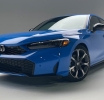Business
The Honda Civic Still Number One in Canada
A Commercial Compromise With Mixed Consequences for the Auto Industry

U.S. President Donald Trump has hailed the new trade framework with the European Union as the “biggest trade deal ever made,” claiming it will be “great for cars.” The agreement, announced on Sunday, establishes a flat 15% tariff on most EU goods.
This represents a notable reduction from Trump’s earlier threat of a 30% tariff starting August 1, and almost halves the previous 27.5% rate on EU auto exports. Industry groups cautiously welcomed the deal for avoiding a deeper trade conflict, but emphasized the financial burden it imposes.
European Commission President Ursula von der Leyen called it a “good deal” following intense negotiations.
“The decisive factor now will be how the agreement is structured and whether it proves reliable,” said Hildegard Müller, President of the German Automotive Industry Association (VDA). She warned, however, that “a 15% U.S. tariff on automotive products will cost German automakers billions annually amid their ongoing transformation.”
The VDA urged the EU to strengthen its investment framework to remain globally competitive.
Sigrid de Vries, Director General of the European Automobile Manufacturers’ Association (ACEA), said the agreement was a positive step toward easing significant uncertainty. Still, she noted that “high U.S. tariffs on vehicles and parts will continue to have adverse effects on the industry on both sides of the Atlantic.”
ING economist Rico Luman said that although a 15% tariff is preferable to 27.5%, “it still represents a significant burden.” He added that “margins are tight, and the cost cannot be fully passed to customers without losing volume.”
Luman also pointed to the weakening U.S. dollar as another obstacle, noting that global automakers are “actively looking to realign manufacturing within existing facilities.”
Despite initial optimism, European markets reversed early gains. The Stoxx Europe Autos Index rose 1.6% before falling. Valeo climbed 4.3%, while Ferrari gained 0.9%. In contrast, BMW, Volkswagen, and Mercedes-Benz all fell by more than 1.3%.
Morningstar analyst Rella Suskin said, “We estimate Porsche, Mercedes, BMW, and Volkswagen will benefit the most from this trade deal due to their high import volumes from Europe into the U.S.” Stellantis, however, which sources only a small fraction of its U.S. sales from Europe, “should not see significant upside,” she noted.
Meredith, Sam. “A Breakthrough and a Burden? What the U.S.-EU Trade Deal Means for the Auto Sector.” CNBC, July 28, 2025. https://www.cnbc.com/2025/07/28/what-the-us-eu-trade-deal-means-for-the-auto-sector.html.

L'Automobile Magazine
News
Business Directory



 En
En  Fr
Fr 


